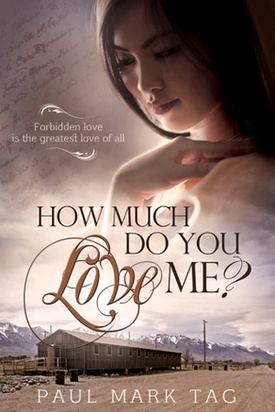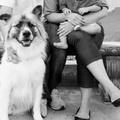How Much Do You Love Me? by Paul Mark Tag is the kind of novel I usually hate.
Here’s the Amazon.com synopsis:
It’s December 1941, and the Japanese have bombed Pearl Harbor. Politicians fuel anti-Japanese hysteria and campaign to segregate Japanese Americans. During this period of hate and racial frenzy, Keiko and James, a Japanese American and a Caucasian, fall in love and marry. Before long, James goes off to war and Keiko to an internment camp.
Sixty years later, Keiko has a stroke and lies near death, while James suffers from Alzheimer’s. Coincidentally, a chance incident makes their daughter, Kazuko, born in the camps, suspect a family secret. Fighting the clock before her mother’s death, she races to unravel the mystery. What she uncovers represents nothing short of the epitome of human love and self-sacrifice. But beyond Kazuko’s dramatic discovery, only the reader knows that this is only half the story.
When I read that synopsis and saw that it was a love story about a Japanese American girl and a Caucasian guy—I immediately thought Snow Falling on Cedars. I unconsciously rolled my eyes and shook my head. Why do all the fictional stories about the Japanese American internment camps involve a love story between a white guy and Japanese American woman?
I figured that I didn’t even have to read the book. I could just bash it based on premise alone.
It doesn’t help that I’m obsessed about the camps and because of my job at the Japanese American National Museum spend almost every day thinking about them. But the camps are more than just a job for me, it’s personal. My father’s side of the family was incarcerated for more than four years. This is all to say that when I hear that a camp story is coming out, I take it very seriously.
I assumed that How Much Do You Love Me? was going to be the kind of book that drove me up the wall—the kind that lacked research and instead relied on outdated stereotypes of Japanese people and facts gleamed from places like Wikipedia. This is why I’m surprised to write that I actually enjoyed the book.
Tag’s portrayal of what happened to Japanese Americans during the Second World War were factual and accurate. If a reader didn’t know anything about the camps or what happened to Japanese Americans, the book would give a good sense of the tragedy.
There were nuggets of truths that I felt made it feel real and showed that the author had done his research. For example, showing the the general fear in the community of what was going to happen post Pearl Harbor, the struggles of the Issei (the first generation) in the camps, the heart wrenching choices families had to make during the war, and the fact that many did not want to talk about the camps after the war.
And then there was the romance between Keiko and James (the two main characters). It felt real. I wanted to hate James, but ended up rooting for them to be together. I especially liked that he wasn’t a “hero” rescuing the girl. And I also like that one of the other major relationships (Keiko’s twin sister) was between two Japanese Americans.
Finally, I liked the mystery. I’m not going to give it away here, but I wanted to find out what the deep dark family secret was. And to Tag’s credit, I figured it out a second before he revealed it. It’s a great family secret and worth the read for that alone.
This is not to say that the book was perfect. I felt that it unfairly sided with the Japanese American veterans in the loyalty questionnaire debate (For more information on the loyalty questionnaire click here). This is a very controversial issue in the community to this day and I’m sensitive toward it because my grandfather was considered by many as disloyal. Tag made it seem like (at least to me) that he was saying the veterans were better and more loyal than those who decided to fight the government in other ways (like my grandfather). But that could have just been my impression. I understand that most people won’t care about this or notice it. But it is important to me so I thought I’d mention it.
I was probably the worst person to review the book. I’d love to hear what people who had no previous knowledge of the camps think of it.
If you’re looking for fictional books about the camps, you can’t go wrong with the standard is Farewell to Manazar by Jeanne Wakatsuki Houston and James D. Houston, but I would personally recommend Journey to Topaz by Yoshiko Uchida and No No Boy by John Okada—with No No Boy being (in my humble opinion) the most important book about Japanese Americans during the World War II era.
However, if you’re looking for a love story and learn some details about a time period in our history (that many would rather choose to forget) then you can do much much worse than How Much Do You Love Me?
*This article was originally published on 8Asians.com, on January 29, 2015.
© 2015 Koji Sakai






